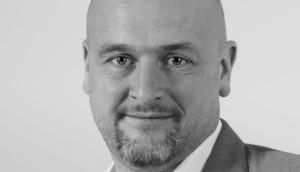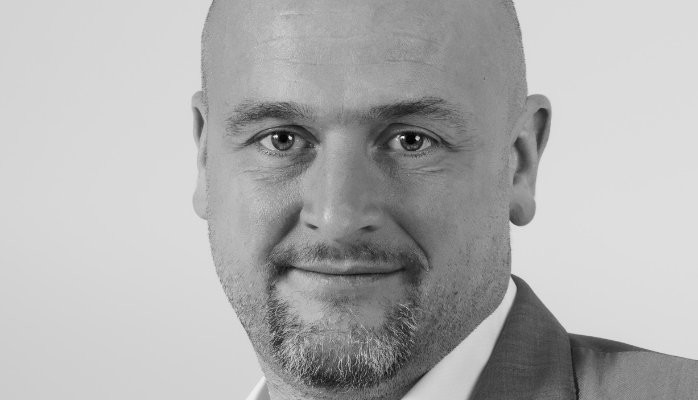

If Claus Rehfeld could start his visiting scholarship at the Sutardja Center all over again, he’d focus less on finding the exact right expert in his field to healthcare data, and spend more time connecting and listening to the diverse people that visit the Center.
Claus, a visiting Ph.D scholar from Denmark, will conclude his time with the Sutardja Center later this month. Throughout his time with SCET, Claus was inspired by the collaborative, forward-thinking, and innovative nature of UC Berkeley’s culture, specifically at SCET.
Claus said working at UC Berkeley was like looking at the global world, because people at SCET and in the Bay Area have a particular orientation to big-picture issues. He compared this to his home country, which he says is less globally-minded than the Center.
“The networking capabilities of the Center are the strongest part of the work environment — people actually walk in here with an open mind,” Claus said.
Visiting from Denmark, Claus explained that there are mindset differences between most Danes and the people he has worked with at SCET. He explained that the world of Danish academia focuses on publishing peer-reviewed articles rather than doing hands-on work in the field or collaborating within industry. Claus added that SCET is “super non-academic in the terms of the universities [he] came from,” but “super academic because research at SCET is about changing the world.”
Claus moved to Berkeley looking for someone who knew more about healthcare data than he did. When he failed to find the right person who knew more about the subject, he realized he had to change his mindset. He had to learn how to broadcast his expertise and transform it into collaboration, which became one of his major lessons from his time at SCET.
One of his earliest memories at Berkeley was during his initial presentation. While showing SCET faculty his introduction presentation about his research, SCET founding director and chief scientist Ikhlaq Sidhu asked him: “So, what do you think comes out of this?”
Ikhlaq’s question exemplifies SCET’s innovative and practical-orientation. Future visiting scholars should be prepared to contextualize their research and express why it’s relevant to the real world, says Claus. SCET is uniquely connected to Silicon Valley and the projects at SCET should be marketable and applicable to the real world.
“What I get the most of sitting at the SCET office is that I meet people,” said Claus. These are people I wouldn’t get to talk to if I was in the library reading a book.”
Unlike the U.S., Denmark has a centralized healthcare system and the Danish government collects an individual’s health data automatically. Claus explained that this gives Denmark an advantage when it comes to having markets for healthcare data. Claus believes Denmark should better leverage its inherent advantage in the healthcare sphere to make positive change through medical data research, preventive medicine, and policy change.
Although Claus sees the benefits that would come out of utilizing Danish healthcare data for good, he understands why Americans are hesitant to share their health data. Coming to America for his research, Claus was able to better understand the American (and global) context for utilization of healthcare data.
Working at SCET, Claus believes, has allowed him to gain a wider, nuanced perspective on healthcare data. He re-emphasized a notion that part of the discussion surrounding health data requires seeing how data can be anonymized to the point where it can be traded without disclosing people’s identities or misusing personal information.
“Maybe ethics is not protecting the data from being used, but finding ways to create a value creation scenario where [being ethical] is more valuable,” Claus added.
Claus complained that Denmark isn’t searching for innovation. Rather, it is closing itself off from anything related to healthcare data, so it’s not pursuing innovation and entrepreneurship.
During the interview, Claus took extra time to explain the Danish healthcare system, specifically as it relates to health data. He encourages any future visiting scholar to take time to talk with people around the university and in the SCET office because those conversations may lead to unforeseen synergies with people involved in industry.
Claus recommends that “anyone with a berkeley.edu email address,” or any Berkeley student, should leverage their status as a student at the top public university to connect with people they admire.


If Claus Rehfeld could start his visiting scholarship at the Sutardja Center all over again, he’d focus less on finding the exact right expert in his field to healthcare data, and spend more time connecting and listening to the diverse people that visit the Center.
Claus, a visiting Ph.D scholar from Denmark, will conclude his time with the Sutardja Center later this month. Throughout his time with SCET, Claus was inspired by the collaborative, forward-thinking, and innovative nature of UC Berkeley’s culture, specifically at SCET.
Claus said working at UC Berkeley was like looking at the global world, because people at SCET and in the Bay Area have a particular orientation to big-picture issues. He compared this to his home country, which he says is less globally-minded than the Center.
“The networking capabilities of the Center are the strongest part of the work environment — people actually walk in here with an open mind,” Claus said.
Visiting from Denmark, Claus explained that there are mindset differences between most Danes and the people he has worked with at SCET. He explained that the world of Danish academia focuses on publishing peer-reviewed articles rather than doing hands-on work in the field or collaborating within industry. Claus added that SCET is “super non-academic in the terms of the universities [he] came from,” but “super academic because research at SCET is about changing the world.”
Claus moved to Berkeley looking for someone who knew more about healthcare data than he did. When he failed to find the right person who knew more about the subject, he realized he had to change his mindset. He had to learn how to broadcast his expertise and transform it into collaboration, which became one of his major lessons from his time at SCET.
One of his earliest memories at Berkeley was during his initial presentation. While showing SCET faculty his introduction presentation about his research, SCET founding director and chief scientist Ikhlaq Sidhu asked him: “So, what do you think comes out of this?”
Ikhlaq’s question exemplifies SCET’s innovative and practical-orientation. Future visiting scholars should be prepared to contextualize their research and express why it’s relevant to the real world, says Claus. SCET is uniquely connected to Silicon Valley and the projects at SCET should be marketable and applicable to the real world.
“What I get the most of sitting at the SCET office is that I meet people,” said Claus. These are people I wouldn’t get to talk to if I was in the library reading a book.”
Unlike the U.S., Denmark has a centralized healthcare system and the Danish government collects an individual’s health data automatically. Claus explained that this gives Denmark an advantage when it comes to having markets for healthcare data. Claus believes Denmark should better leverage its inherent advantage in the healthcare sphere to make positive change through medical data research, preventive medicine, and policy change.
Although Claus sees the benefits that would come out of utilizing Danish healthcare data for good, he understands why Americans are hesitant to share their health data. Coming to America for his research, Claus was able to better understand the American (and global) context for utilization of healthcare data.
Working at SCET, Claus believes, has allowed him to gain a wider, nuanced perspective on healthcare data. He re-emphasized a notion that part of the discussion surrounding health data requires seeing how data can be anonymized to the point where it can be traded without disclosing people’s identities or misusing personal information.
“Maybe ethics is not protecting the data from being used, but finding ways to create a value creation scenario where [being ethical] is more valuable,” Claus added.
Claus complained that Denmark isn’t searching for innovation. Rather, it is closing itself off from anything related to healthcare data, so it’s not pursuing innovation and entrepreneurship.
During the interview, Claus took extra time to explain the Danish healthcare system, specifically as it relates to health data. He encourages any future visiting scholar to take time to talk with people around the university and in the SCET office because those conversations may lead to unforeseen synergies with people involved in industry.
Claus recommends that “anyone with a berkeley.edu email address,” or any Berkeley student, should leverage their status as a student at the top public university to connect with people they admire.
